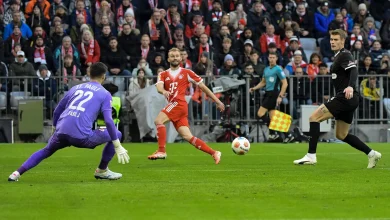The 12 (ish) best Christmas movies on Disney+

As some of us start winding down for the festive season, there’s nothing nicer than checking out what Christmas movies are streaming on the various platforms in the run-up to the big day.
We’ve already taken a look at Netflix’s festive offerings and now we’re going to look at some of the best Christmas movies on Disney+.
Home Alone (1 and 2)
Home Alone Pic: 20th Century Studios
We’re kicking off our list with a Christmas classic as Home Alone (both the first and the sequel) are now streaming on Disney+.
The first and second Home Alone films are widely accepted as the most popular, and rightfully so, Home Alone 3, 4, The Holiday Heist and, the more recent outing, Home Sweet Home Alone are all also streaming.
However, we’re only including the first two instalments on this list as, let’s face it, they’re the best.
The Santa Clause (1, 2 and 3)
The Santa Clause Pic: Disney
When a cold-hearted businessman accidentally kills Santa and puts on his suit to finish his Christmas Eve run, he accidentally becomes the next Santa Claus and over the next 12 months, his character and features begin to get much more… jolly.
All three instalments of The Santa Clause franchise are on Disney+ now and the spin-off series The Santa Clauses is now streaming its two seasons as well.
The Muppet Christmas Carol
Muppet Christmas Carol Pic: Disney
If you ask us, The Muppet Christmas Carol isn’t just the superior adaptation, but is a must-watch at Christmas.
Not only does it feature all of our favourite puppet pals in the Charles Dickens’ classic, it also stars Michael Caine as Ebenezer Scrooge.
While initially it was only the theatrical release that was streaming, to celebrate the film’s 30th anniversary, fans can now check out the full version by clicking into the ‘extras’ on the film’s Disney+ page.
The Guardians of the Galaxy Holiday Special
Guardians of the Galaxy Holiday Special Pic: Marvel Studios
Released on November 25, 2022, The Guardians of the Galaxy are back, but this time, in festive form. When Star Lord is feeling the holiday blues, his friends try to cheer him up by getting him the best present for Christmas.
They decide that the best gift they could get is to find his hero, Kevin Bacon, kidnap him, and give him to Quill. What could possibly go wrong?
It’s a fun frolic through the galaxy at Christmas time, and seeing the joy a little elf decoration brings Drax is adorable.
Jingle All The Way
Jingle All The Way Pic: 20th Century Studios
Workaholic Howard Langston wants to make things up to his son, Jamie and wife, Liz and promises to get Jamie the hottest toy of the season, Turbo-Man — even though it’s Christmas Eve and the toy is practically sold out.
As Langston hunts down the elusive gift, he runs into mailman Myron, another father on the same quest. With the clock winding down, Langston’s moral code is tested as he starts to learn the real meaning of Christmas.
The Grinch
Pic: Universal/Getty Images
The Grinch has found a new home on streaming this festive season so fans will still be able to watch the classic Christmas movie.
The Grinch resides outside the town of Whoville, whose inhabitants adore Christmas, but he despises them and the festival.
Cindy, a young resident, decides to befriend the Grinch, hoping to make him love Christmas, and hence, she can love the holiday too.
Noelle
Noelle Pic: Disney+
Released in 2019, Noelle follows Kris Kringle’s daughter as she goes in search of her brother to bring him back to the North Pole in time to save Christmas.
It’s a cute festive film and if you’re not in the mood for one of the classics, you can give this new kid on the block a try.
A Christmas Carol
A Christmas Carol Pic: Disney
Going full on animation as opposed to relying on the Muppets this time around, the Dickens’ classic is brought to life with Jim Carrey as Scrooge.
In fact, one of the reasons Scrooge kind of looks like Carrey is because Robert Zemeckis decided to use motion capture to bring the characters to life like he did for The Polar Express.
The Nutcracker and the Four Realms
The Nutcracker and the Four Realms Pic: Disney
Young Clara needs a magical, one-of-a-kind key to unlock a box that contains a priceless gift. A golden thread leads her to the coveted key, but it soon disappears into a strange and mysterious parallel world.
In that world, she meets a soldier named Phillip, a group of mice and the regents who preside over three realms. Clara and Phillip must now enter a fourth realm to retrieve the key and restore harmony to the unstable land.
The Search For Santa Paws
The Search for Santa Paws Pic: Disney
Santa Claus and his faithful canine companion Santa Paws leave their chilly home at the North Pole on an important mission.
They must try to persuade the heir of one of their greatest benefactors, toy store owner Mr Hucklebuckle, to continue with his grandfather’s good works.
Die Hard
Die Hard Pic: 20th Century Studios
Yes, yes we know… many people out there don’t believe that Die Hard isn’t a Christmas movie and while it might not be one in the traditional sense, it is set on Christmas Eve and so, it makes the list.
The official synopsis for Die Hard, reads: ‘New York City policeman John McClane is visiting his estranged wife and two daughters on Christmas Eve.
‘He joins her at a holiday party in the headquarters of the Japanese-owned business she works for. But the festivities are interrupted by a group of terrorists who take over the exclusive high-rise, and everyone in it. Very soon, McClane realises that there’s no one to save the hostages… but him.’
Special Mention: The Nightmare Before Christmas
The Nightmare Before Christmas Pic: Disney
The debate as to when to watch the Nightmare Before Christmas has lived on for many a year and while we would say it’s a November film, midway between Halloween and Christmas, it is still about the festive season mostly.
When Jack Skellington is feeling blue about his own holiday, Halloween, he accidentally stumbles into Christmas Town and gets the ‘great’ idea to take over Christmas this year.




